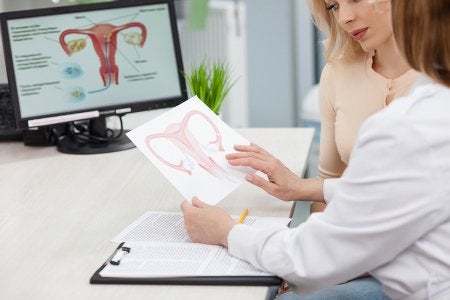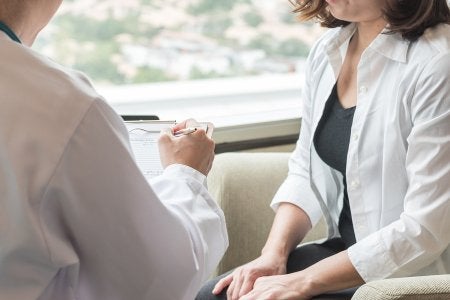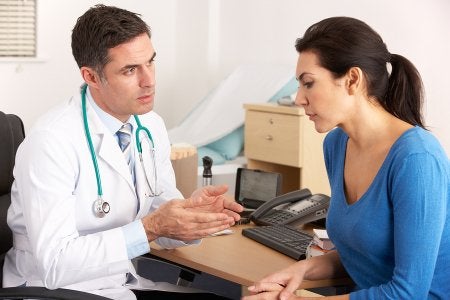-
Diabetes and Yeast Infections: Get the Facts
Yeast infections occur when an overgrowth of a type of fungus known as candidiasis occurs in the vagina. They can happen to any woman, but they are especially common in women with diabetes. If you have diabetes, it’s important to make sure your gynecologist knows, so that he or she can help you manage your risk of yeast infections. Here are the facts you need to know.

High blood sugar levels mean an increase in yeast infections.
Diabetes causes blood sugar levels to rise. In type 1 diabetes, the pancreas no longer produces insulin after it is attacked by the immune system, so that body cannot convert glucose into energy, causing blood sugar levels to increase. With type 2 diabetes, the body cannot use insulin effectively to control blood glucose, allowing blood sugar to increase. With both types of diabetes, one of the effects of excess sugar is in the blood is yeast infections. The reason for this is that sugar feeds yeast. High blood sugar levels encourage an overgrowth of yeast that can affect multiple parts of the body, including the vagina.
Recurrent yeast infections are a symptom of diabetes.
There are many different things that can cause yeast infections, including medications, some birth control methods, and being pregnant. However, if you suddenly develop severe or recurring yeast infections, your gynecologist may recommend that you be screened for diabetes. Before being diagnosed with diabetes, yeast infections are a common symptom reported by women.
There are things you can do to reduce your risk of yeast infections.
If you have diabetes, following your treatment plan to keep your blood sugar levels in a healthy range will reduce the risk of yeast infections. Avoid using vaginal sprays, douches, or scented menstrual pads and tampons. Don’t sit around in wet bathing suits or workout clothes, and choose cotton underwear.
If you think you have yeast infection, make an appointment with Washington Surgi-Clinic for treatment today. For more information about yeast infection treatments in Washington, D.C., call (202) 659-9403.
Common Yeast Infection Causes
Yeast infections can be uncomfortable and annoying, but most women experience them occasionally. Understanding the causes of this common vaginal infection is the first step to preventing infections in the future. In addition to providing treatment, your gynecologist can help you pinpoint the culprit behind your yeast infection.

There are many different things that can case yeast infections. A common trigger for many women is taking antibiotics. In addition to killing off the bacteria that are causing whatever illness you have, antibiotics can kill the good bacteria in the vagina that help to control the growth of yeast. Wearing tight underwear, using scented feminine products, or not changing a tampon frequently enough can all also contribute to yeast infections. Women who have diabetes can suffer from frequent yeast infections when their glucose levels are high.
Don’t let the discomfort of yeast infections interfere with your life. See a gynecologist at Washington Surgi-Clinic for vaginal infection treatment in Washington, DC when symptoms strike. Make an appointment by calling (202) 659-9403.
Why Your Well Woman Exam Matters
Seeing your gynecologist regularly for a well woman exam is one of the most impactful things you can do for your health. This exam gives you a chance to discuss birth control methods, get screened for cancer, and much more.
Watch this video to learn more about the importance of well woman exams. Women of all ages can benefit from see a doctor regularly for preventive care and to get help making choices about pregnancy prevention, STD testing, and other important aspects of your health.
Washington Surgi-Clinic offers affordable and confidential gynecology services in Washington, DC, including vaginal infection testing and Pap smears. To schedule an appointment, call (202) 659-9403.
Questions to Ask Your Gynecologist About Your Period
Periods are such a common part of life for women that it is easy to overlook the importance of discussing them with your gynecologist. You don’t have to wait until you have a problem with your period to bring it up during your next gynecology appointment . When you see your doctor, consider asking these questions.
How do I know if my flow is too heavy?
There is a wide range of normal when it comes to menstrual flow. It’s even normal for the same woman to experience an extremely heavy period followed by an extremely light one. However, if you have to change a pad or tampon at least once an hour, your flow may be excessively heavy. There are a few conditions that can cause an excessive menstrual flow, which your gynecologist can easily screen you for.

What is a normal cycle?
The only kind of normal menstrual cycle is what is normal for you. Some women get their periods like clockwork, while others experience irregular periods as a rule. Keep track of your periods so you can begin to notice patterns in your cycle, and report things that seem off-kilter to your gynecologist. If you start skipping periods or if your periods are coming more often than normal, an underlying medical condition could be to blame.
Does having my period mean I can’t get pregnant?
Getting pregnant during your period isn’t likely, but it is possible. Some women ovulate early in their cycles, and because sperm can live in your reproductive tract for five days, you could have sex during your period and then have your period end and ovulate while sperm is still there. Don’t use your period as birth control if you want to avoid a pregnancy.
Getting informed about your period is an important step in taking control of your health. At Washington Surgi-Clinic, our gynecologists can help with everything from period tips to Pap smears and birth control methods. Schedule an appointment with a gynecologist in Washington, DC by calling (202) 659-9403.
What to Expect When You Take the Morning After Pill
If you have sex without using any kind of birth control or if you think your pregnancy prevention method may have failed, the morning-after pill can reduce the chances of an unwanted pregnancy. It’s important to note that the morning-after pill is not the same thing as an abortion. It doesn’t terminate an existing pregnancy but rather makes it more difficult to become pregnant. If you take this form of emergency birth control, here is what you can expect.
Nausea
Nausea is one of the most common side effects women have after taking the morning-after pill. The nausea usually peaks within 24 hours of taking the medication and resolves completely within a day or two. In most cases, over-the-counter anti-nausea medications are effective in managing the symptoms, but call your gynecologist if you develop diarrhea or vomiting within a few hours of taking the morning-after pill, as the effectiveness of the medication may be impacted.

PMS-Like Symptoms
The morning-after pill contains high doses of hormones that are similar to the ones used in birth control pills. As such, side effects that mimic PMS are common. Women may experience cramps, breast tenderness, mood swings, and back pain. These symptoms can vary from woman to woman, but they usually subside within 24 hours of taking the pill.
Bleeding
Irregular bleeding is common with the morning-after pill. In some cases, spotting occurs the same day you take the pill and may continue until your next period. Some women get their next period earlier or later than normal after taking the morning-after pill. If your period doesn’t start within five days of when you expected it, talk to your gynecologist. You may need to take a pregnancy test.
At Washington Surgi-Clinic, we empower you to make the right choices for your reproductive health by providing variety of birth control methods and pregnancy termination services in Washington, DC . To make a confidential appointment, call (202) 659-9403.
The Importance of Pap Smears
Not every woman needs a pap smear every single year, but every woman (except those without a cervix) should get them on a regular basis. Your gynecologist will let you know how often you should have this important preventive health screening. Pap smears involve taking a sample of cells from the cervix and examining them in a lab. The purpose is to identify potentially abnormal changes of the cervix, called cervical dysplasia. If abnormal changes are detected, the patient can receive treatment before the abnormality develops into cervical cancer.

Pap smears are uncomfortable, but they shouldn’t be painful. If you’ve been avoiding pap smears because of an unfavorable experience in the past, you should find a gynecologist you can trust. Talk to the doctor about your concerns. As advocates of women’s health, gynecologists generally want to do everything possible to help their patients have a stress-free, positive experience.
At Washington Surgi-Clinic, we’re known for our warm and caring professionals , whom you can consider your partners in health. Call (202) 659-9403 to schedule your next pap smear in Washington, D.C.
Spotting the Signs of Chlamydia
Chlamydia is a bacterial infection that can be transmitted via oral, anal, and vaginal sex, and even through skin to skin contact. Chlamydia is quite common, and women often don’t realize they have it because symptoms don’t always occur. If you’re sexually active, consider talking to a gynecologist about STD testing.
Watch the accompanying video to learn the signs of chlamydia. This doctor explains the symptoms in both men and women. For women, the red flags include abnormal vaginal discharge, pelvic pain, pain during sex, and bleeding between periods. For this particular STD, the treatment is a course of antibiotics.
Washington Surgi-Clinic offers confidential STD testing services in Washington, D.C. You can call our women’s health clinic at (202) 659-9403 to request an appointment with one of our compassionate gynecologists.
Preparing for a Second Trimester Abortion
A second trimester abortion is performed any time between 12 and 26 weeks. This is past the point at which a woman can have a medical abortion with medications, and so a minimally invasive procedure is necessary. When you speak with your gynecologist about pregnancy termination, she will give you all the information you need to prepare for the procedure and have a healthy recovery.

Consultation and Exam
A second trimester abortion can usually be performed in two visits, although sometimes three visits are needed. Occasionally, just one visit is necessary. First, you’ll speak with the gynecologist about the procedure. Take your time learning about it and what you can expect, and ask any questions you have. You’ll have a physical exam, including an ultrasound exam.
Medications and Alcohol Use
You may be asked to adjust your medication dosage schedule, if applicable. Let the gynecologist know about all over-the-counter (OTC) and prescribed medications you’re using, along with your supplements, if applicable. Some medications can interfere with blood clotting, and you may be asked to temporarily discontinue these. You should also avoid alcohol use for 24 hours prior to the procedure.
Laminaria Insertion
Laminaria sticks are thin, sterile rods made of seaweed. Your doctor may need to insert them into your cervix and leave them there overnight before performing the rest of the procedure the next day. They work by gently dilating the cervix . If you’ve taken a prescription pain reliever or anti-anxiety medication for the laminaria insertion, someone else will need to drive you home. You’ll be asked to avoid eating or drinking anything after midnight. A responsible adult should drive you to the clinic the next day. Before your procedure, you’ll have your choice of local, conscious, or general anesthesia.
Women choose Washington Surgi-Clinic because of our commitment to the highest standards of patient care and safety. Our abortion providers in Washington, D.C. are highly trained, board-certified doctors who firmly believe in giving each patient the compassionate and respectful care she deserves. Schedule an appointment today by calling (202) 659-9403.
Which STDs Can Affect Your Fertility?
Fertility can be a sensitive topic for women, whether or not they’re actively trying to conceive a child. But you should feel comfortable discussing any aspect of your sexual and reproductive health with your gynecologist . Your doctor genuinely cares about your well-being, and will gladly answer your questions about sexually transmitted diseases (STDs) and how they might affect fertility.

Chlamydia
This is one of the most commonly transmitted STDs. It’s caused by a bacterial infection. Since many people with chlamydia never experience symptoms, it’s easy to spread it to a partner without realizing it. Women who are sexually active can request STD testing to find out if they might have chlamydia. This is especially important if they intend on conceiving a child someday, as chlamydia can adversely affect fertility by spreading to the fallopian tubes. The fallopian tubes may develop scar tissue, which interferes with the transfer of the egg, or they can become blocked altogether. The complications of chlamydia can also increase the risk of ectopic pregnancy, which is a life-threatening emergency that requires prompt medical intervention.
Gonorrhea
Like chlamydia, gonorrhea is spread by a bacterium and often causes no symptoms. If left untreated, gonorrhea can affect many areas of the body, including the eyes, throat, joints, and rectum. It can also cause infertility in both men and women. Women with untreated gonorrhea can develop pelvic inflammatory disease (PID) and scar tissue in the fallopian tubes. If women are able to get pregnant, gonorrhea increases the risk of pregnancy complications.
Pelvic Inflammatory Disease (PID)
PID isn’t just caused by gonorrhea. It can also be a complication of chlamydia and other STDs. Additionally, many other bacterial infections that aren’t sexually transmitted can lead to PID. PID can inflict damage on a woman’s reproductive organs . It can also cause chronic pelvic pain, tubo-ovarian abscesses, and ectopic pregnancy. The longer PID is left untreated, the greater the risk of complications is.
Washington Surgi-Clinic is a modern medical facility that provides gynecology services in Washington, D.C. Our board-certified physicians are committed to providing exceptionally courteous and respectful care, which includes STD treatment. Call (202) 659-9403.
What Causes Genital Warts?
Genital warts are an extremely common STD. The human papilloma virus, or HPV, causes them. There are many strains of HPV, and the strain that you have determines the kinds of symptoms you will experience and the kinds of complications that could potentially occur. If you suspect that you could have genital warts, then see your gynecologist for an accurate diagnosis and HPV treatment.

Genital warts sometimes appear as bumps or clusters of bumps in the genital region, though sometimes the bumps are not visible. In addition to the appearance of warts, people with HPV may experience itching, bleeding, burning pain, and vaginal discharge. Some forms of HPV also increase the risk of cervical cancer, so if you are diagnosed, your gynecologist may recommend more frequent Pap tests.
Washington Surgi-Clinic offers confidential STD testing in Washington, D.C., as well as a range of other women’s health services. To make an appointment for STD testing or treatment, Pap smears, and other gynecology services , please call (202) 659-9403.
Recent Posts
Popular Posts
categories
- Uncategorized
- STD
- Washington Surgi-Clinic
- Abortion
- Pregnancy
- Pap Smears
- Birth Control Options
- HPV
- Gynecologist
- Pregnancy Test
- Abortion Safety
- IUD
- Pregnancy Termination
- First Trimister
- Cervical Cancer
- Morning After Pill
- Birth Control Pills
- Chlamydia
- Birth Control Shot
- Gonorrhea
- STD Testing
- Birth Control Implant
- Pelvic Pain
- Birth Control Patch
- HIV
- HPV Vaccine
